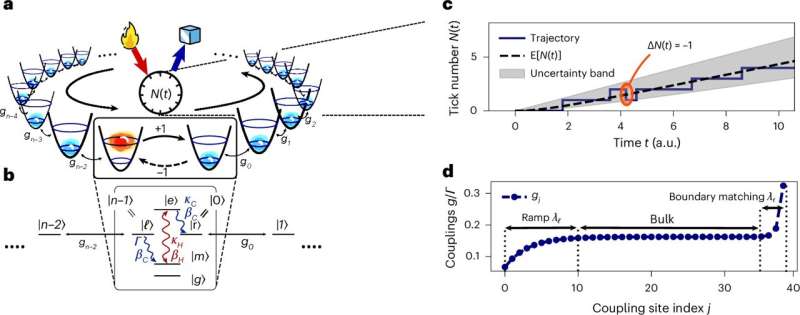
In recent years, scientists have been on a quest to create more advanced and accurate clocks. These devices are crucial for measuring quick physical events, which helps confirm various scientific theories. Among the cutting-edge options, there are “quantum clocks,” which use the strange rules of quantum mechanics to tell time with incredible precision.
After discussions at the Quantum Thermodynamics Conference (QTD) 2023 in Vienna, a team from Technische Universität Wien (TU Wien), the Austrian Academy of Sciences, Chalmers University of Technology, and the University of Malta embarked on developing a new microscopic quantum clock. This clock aims to be extremely accurate while using much less energy. Their approach was detailed in a paper published in Nature Physics.
Marcus Huber, a senior author of the study, explained, “Our main idea is to find a balance between a clock’s precision and its resolution. We can wait for a group of particles to pass through, similar to an hourglass, which helps us measure time more accurately, even if it takes longer.”
“The concept applies to traditional mechanical clocks as well,” Huber added, “but each action—whether it’s a grain of sand, the movement of the second hand, or sensing electromagnetic fields from lasers—consumes energy.”
When something irreversible happens, it requires energy, leading to a dissipation of energy from any clock. Thus, improving accuracy in clocks generally means increasing disorder or entropy.
For conventional clocks, whether mechanical or simple quantum ones, there’s a direct link between accuracy and energy loss—double the accuracy, and you double the energy waste.
“What makes our quantum many-body clock unique is its ability to transport events smoothly and coherently, avoiding any irreversible loss of energy,” noted Huber. “It’s like a clock’s second hand moving without interruption yet still enhancing the accuracy of the minute hand. This allows us to improve precision without generating excessive entropy.”
The innovative design introduced by Huber’s team focuses on a process known as coherent quantum transport, enabling the transfer of quantum states without losing energy. This could result in a clock that uses far less power compared to traditional models.
“With our setup, each complete cycle of the clock would cause much less energy depletion than a standard clock, which always generates entropy as it ticks,” explained Florian Meier, the paper’s lead author.
This new quantum clock challenges the belief that greater accuracy always requires more energy loss. It may pave the way for highly precise and energy-efficient quantum timekeeping methods in the future.
“Currently, energy loss isn’t the biggest hurdle for top-tier clocks,” said Meier. “However, as we push technology forward, we may reach a stage where energy loss will start to limit our precision. It’s reminiscent of how energy concerns in classical computing developed over time. Now, in massive data centers, it’s a pressing issue. We foresee a similar scenario for high-precision clocks.”
While the researchers acknowledge that energy loss will eventually cap the extent to which quantum clock precision can improve, their paper suggests foundational principles that could help decrease this energy loss moving forward. Huber, Meier, and their team plan to experiment with prototypes of their quantum clock to further test and validate its capabilities.
Simone Gasparinetti, a senior author from Chalmers, shared, “We are currently constructing a prototype using superconducting circuits similar to those in quantum computers made by IBM and Google. While creating a quantum clock from these circuits is different, we believe we’re close to demonstrating the advantages mentioned in our research.”
By merging time, thermodynamics, and quantum mechanics, this research opens exciting avenues for applying quantum effects in nanoscale energy science. In future experiments, they aim to highlight the benefits of their quantum clock design.
“We aspire to explore practical applications of such high-precision processes while minimizing energy loss,” stressed Huber.
Written by Ingrid Fadelli, edited by Stephanie Baum, and reviewed by Robert Egan. Your support helps sustain independent science journalism. Please consider making a donation (especially monthly) for an ad-free experience.
More information:
Florian Meier et al, Precision is not limited by the second law of thermodynamics, Nature Physics (2025). DOI: 10.1038/s41567-025-02929-2.
If you would like to see similar Tech posts like this, click here & share this article with your friends!

